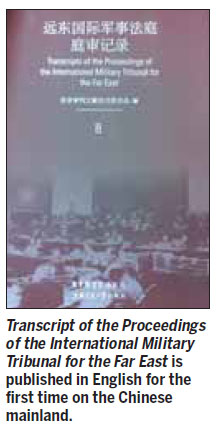Tokyo War Crime Trial book published in China
Updated: 2013-09-17 07:26
By Zhang Yue (China Daily)
|
|||||||||||
A book detailing the Tokyo War Crime Trials was published for the first time on the Chinese mainland on Sept 2, marking the 68th anniversary of China's victory on the War of Resistance against Japanese Aggression (1937-45).
Transcript of the Proceedings of the International Military Tribunal for the Far East is 50,000 pages long and comprises 80 volumes. It has been jointly published in English by Shanghai Jiaotong University Press and the National Library of China. The book covers the details of the Tokyo War Crime trials that ran from May 3, 1946 to Nov 12, 1948.
The publication took about two years, according to Cheng Zhaoqi, head of the Tokyo Trial Research Center affiliated to Shanghai Jiaotong University.
In February 2011, the National Library of China bought the microfilm of the original 50,000 pages of transcript of the trial from the National Archives and Records Administration of the United States. Review and calibration work started in 2012.

"We know the present publication is not 100 percent perfect, but it marks a milestone for research on the Tokyo Crime Trial on the Chinese mainland," Cheng says.
This is the first time the record has been published in China. The transcript was first published by Japan in 1968, and published in the US and the United Kingdom in 1998.
Mei Zi'ao, son of Mei Ru'ao, who was one of the Chinese judges of the International Military Tribunal for the Far East, attended the book launch.
Though he was born in 1952, four years after the trial ended, he says the two-year trial left an impression on his father's personality.
"He seldom talked about the trial to me and my older sister," Mei Zi'ao recalls.
"But from what I remember, he became a bit lonely as he got older, and easily agitated (because of the trial).
"Most stories try to mold my father as a great, patriotic figure, which is actually a bit problematic because my father was the judge. And the judge's duty is to be as objective as possible no matter how much hatred he bears in his heart," Mei says.
He and his sister have donated most of their father's journals to the National Museum of China. He now works as an editor at China Youth Daily, and occasionally attends academic seminars on the International Military Tribunal for the Far East.
zhangyue@chinadaily.com.cn
(China Daily 09/17/2013 page19)
Today's Top News
List of approved GM food clarified
ID checks for express deliveries in Guangdong
Govt to expand elderly care
University asks freshmen to sign suicide disclaimer
Tibet gears up for new climbing season
Media asked to promote Sino-Indian ties
Shots fired at Washington Navy Yard
Minimum growth rate set at 7%
Hot Topics
Lunar probe , China growth forecasts, Emission rules get tougher, China seen through 'colored lens', International board,
Editor's Picks

|

|

|

|

|

|





